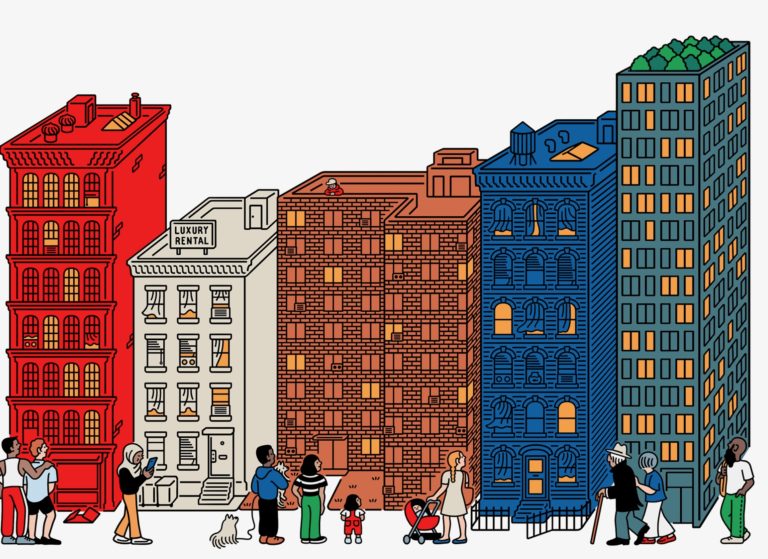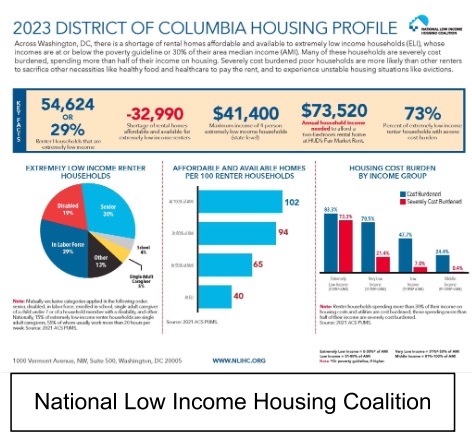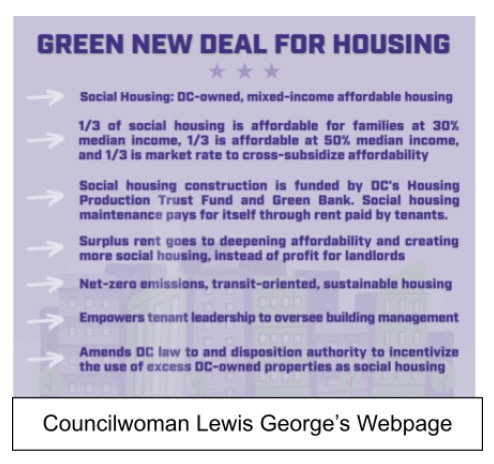Graphic from The New York Times
On Thursday, Jan. 25, I listened to NPR’s Morning Edition as usual when getting ready for class, and a startling statistic caught my attention. According to a newly released report from Harvard University, a record half of renters paid more than 30% of their income on rent and utility costs in 2022. The study also found that homelessness has hit a record high following a decline in pandemic-era aid. The unaffordability of housing in the US isn’t a novel discovery, but this looming problem promises to worsen as demand and costs for housing increase while supply lingers behind.
Reports on DC dating back to 2015 echo an eerily similar warning. The Greater Greater Washington reported that the demand for housing grew with DC’s population, while DC’s stock of affordable rentals declined. More than 1 in 10 DC residents lack stable housing, according to a 2023 report from the DCist. The problem is growing, and despite many nonprofits seeking affordable rental units and subsidies and loans from federal and quasi-governmental agencies – including Housing and Urban Development (HUD) and the Federal Housing Administration (FHA) – a growing share of DC renters are becoming more and more cost-burdened by rent. So what’s the solution?
Social housing is a growing affordable housing concept gaining headway in DC’s local government. It is non-market, publicly-owned housing operated by local governments. One of the main draws of social housing as opposed to traditional federally owned housing is that it allows for a greater level of accountability and greater control over property management.
The DCist touches on another inclusionary mixed-income policy of social housing, citing an example in Vienna where tenants are paying 20-25% of their income and aren’t required to move out when their income increases. Social housing provides units to renters with various income levels and avoids the pitfalls of Low Income Housing Tax Credit loans that only guarantee affordable housing for 30 years. The Maryland Housing Opportunities Commission opened the Laureate in 2023, which used revolving funds and bonds to dedicate 30% of its units to public affordable housing. This type of affordable housing, with funding from municipal bond markets and federal grants, is promising and tangible.
Social housing seeks to take affordable housing out of the financial and real estate industry where it is used as a tool for generating huge profits for investors and the private market. The Center for Social Housing is addressing the exploding housing costs and the displacement of millions from evictions and foreclosures. Their solution: promoting deeply affordable and green living via social housing. By being publicly owned, social housing eliminates profit liability to corporations and reimagines housing as it should be: a human right. According to an article from The Guardian, espousing the need for housing run by public authority, social housing creates an influx of housing while “minimizing the displacement risk caused by luxury developments.”
One of DC’s strongest advocates for social housing is Councilwoman Janeese Lewis George, who proposed the Green New Deal for Housing Act in 2022 to create sustainable, publicly owned, mixed-income housing in DC.
While social housing remains an optimistic possibility for the future of affordable housing, DC is still actively combating its housing crises. Mayor Bowser recently made headway in her goal of creating 12,000 affordable rental homes by 2025 by opening Station U & O on January 18, a mixed-use housing development in the Shaw neighborhood. December 18 of last year was a groundbreaking day for green affordable housing with the opening of the first 100% green Cycle House building in Truxton. Washington DC housing agencies, including the DC Housing Authority, DC Government Department of Housing and Community Development, and the FHA, continue connecting renters with affordable units, programs, and bond issuances to investors. DC is also home to many nonprofits seeking to combat homelessness and provide affordable housing for those in need: N-Street Village, Pathways to Housing, So Others Might Eat, and Housing Up to name a few!
The affordable housing problem in America is extensive. Developers continue to cater to high-end renters, while low and middle-income people struggle to find affordable homes that don’t leave them cost-burdened. The answer is to control renting costs by subsidizing public housing to combat the shortage of units. As housing agencies and nonprofits continue in their fight to develop and establish programs for affordable housing and those in need, social housing offers a fresh, community-focused approach. DC is certainly making strides, but more is needed to combat the 82,000 DC residents needing secure housing. Social housing may be the answer, or at least a way to move further forward.




